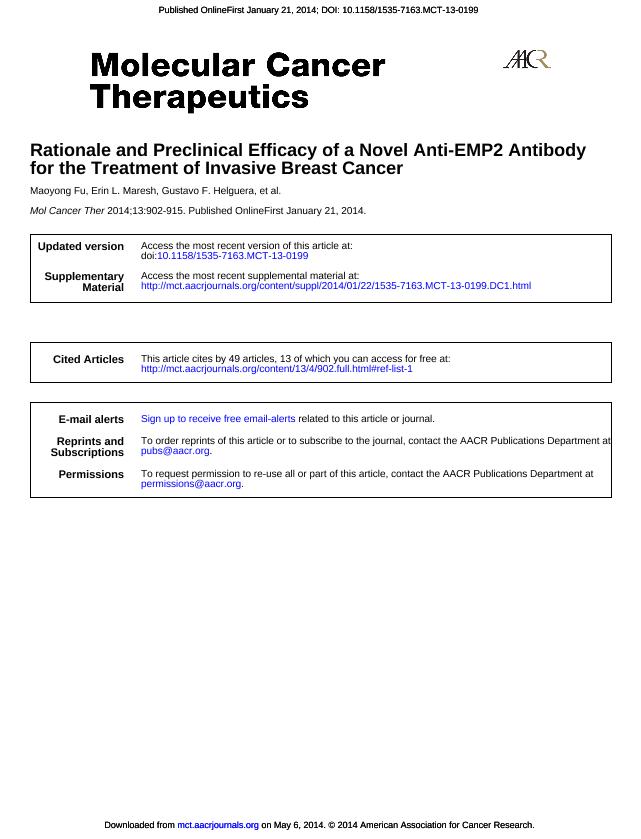Mostrar el registro sencillo del ítem
dc.contributor.author
Fu, Maoyong
dc.contributor.author
Maresh , Erin L.
dc.contributor.author
Helguera, Gustavo Fernando

dc.contributor.author
Kiyohara, Meagan
dc.contributor.author
Qin, yu
dc.contributor.author
Ashki, Negin
dc.contributor.author
Daniels Wells, Tracy R.
dc.contributor.author
Aziz, Najib
dc.contributor.author
Gordon, Lynn K.
dc.contributor.author
Braun, Jonathan
dc.contributor.author
Elshimali, Yahya
dc.contributor.author
Soslow, Robert A.
dc.contributor.author
Penichet, Manuel L.
dc.contributor.author
Goodglick, Lee
dc.contributor.author
Wadehra, Madhuri
dc.date.available
2016-07-26T14:16:13Z
dc.date.issued
2014-04-01
dc.identifier.citation
Fu, Maoyong; Maresh , Erin L.; Helguera, Gustavo Fernando; Kiyohara, Meagan ; Qin, yu; et al.; Rationale and preclinical efficacy of a novel anti-EMP2 antibody for the treatment of invasive breast cancer; American Association For Cancer Research; Molecular Cancer Therapeutics; 13; 4; 1-4-2014; 902-915
dc.identifier.issn
1535-7163
dc.identifier.uri
http://hdl.handle.net/11336/6679
dc.description.abstract
Despite significant advances in biology and medicine, the incidence and mortality due to breast cancer worldwide is still unacceptably high. Thus, there is an urgent need to discover new molecular targets. In this article, we show evidence for a novel target in human breast cancer, the tetraspan protein epithelial membrane protein-2 (EMP2). Using tissue tumor arrays, protein expression of EMP2 was measured and found to be minimal in normal mammary tissue, but it was upregulated in 63% of invasive breast cancer tumors and in 73% of triple-negative tumors tested. To test the hypothesis that EMP2 may be a suitable target for therapy, we constructed a fully human immunoglobulin G1 (IgG1) antibody specific for a conserved domain of human and murine EMP2. Treatment of breast cancer cells with the anti-EMP2 IgG1 significantly inhibited EMP2-mediated signaling, blocked FAK/Src signaling, inhibited invasion, and promoted apoptosis in vitro. In both human xenograft and syngeneic metastatic tumor monotherapy models, anti-EMP2 IgG1 retarded tumor growth without detectable systemic toxicity. This antitumor effect was, in part, attributable to a potent antibody-dependent cell-mediated cytotoxicity response as well as direct cytotoxicity induced by the monoclonal antibody. Together, these results identify EMP2 as a novel therapeutic target for invasive breast cancer.
dc.format
application/pdf
dc.language.iso
eng
dc.publisher
American Association For Cancer Research

dc.rights
info:eu-repo/semantics/openAccess
dc.rights.uri
https://creativecommons.org/licenses/by-nc-sa/2.5/ar/
dc.subject
Emp2
dc.subject
Monoclonal
dc.subject
Antibody
dc.subject
Cancer
dc.subject.classification
Patología

dc.subject.classification
Medicina Básica

dc.subject.classification
CIENCIAS MÉDICAS Y DE LA SALUD

dc.subject.classification
Otras Biotecnologías de la Salud

dc.subject.classification
Biotecnología de la Salud

dc.subject.classification
CIENCIAS MÉDICAS Y DE LA SALUD

dc.title
Rationale and preclinical efficacy of a novel anti-EMP2 antibody for the treatment of invasive breast cancer
dc.type
info:eu-repo/semantics/article
dc.type
info:ar-repo/semantics/artículo
dc.type
info:eu-repo/semantics/publishedVersion
dc.date.updated
2016-06-15T19:08:42Z
dc.identifier.eissn
1538-8514
dc.journal.volume
13
dc.journal.number
4
dc.journal.pagination
902-915
dc.journal.pais
Estados Unidos

dc.journal.ciudad
Philadelphia
dc.description.fil
Fil: Fu, Maoyong. University of California Los Angeles. David Geffen School of Medicine at UCLA; Estados Unidos
dc.description.fil
Fil: Maresh , Erin L.. University of California Los Angeles. David Geffen School of Medicine at UCLA; Estados Unidos
dc.description.fil
Fil: Helguera, Gustavo Fernando. Consejo Nacional de Investigaciones Científicas y Técnicas. Instituto de Biología y Medicina Experimental (i); Argentina. Universidad de Buenos Aires; Argentina
dc.description.fil
Fil: Kiyohara, Meagan. University of California Los Angeles. David Geffen School of Medicine at UCLA; Estados Unidos
dc.description.fil
Fil: Qin, yu. University of California Los Angeles. David Geffen School of Medicine at UCLA; Estados Unidos
dc.description.fil
Fil: Ashki, Negin. University of California Los Angeles. David Geffen School of Medicine at UCLA; Estados Unidos
dc.description.fil
Fil: Daniels Wells, Tracy R.. University of California Los Angeles. David Geffen School of Medicine at UCLA; Estados Unidos
dc.description.fil
Fil: Aziz, Najib. University of California Los Angeles. David Geffen School of Medicine at UCLA; Estados Unidos
dc.description.fil
Fil: Gordon, Lynn K.. University of California Los Angeles. David Geffen School of Medicine at UCLA; Estados Unidos
dc.description.fil
Fil: Braun, Jonathan. University of California Los Angeles. David Geffen School of Medicine at UCLA; Estados Unidos
dc.description.fil
Fil: Elshimali, Yahya. Charles Drew University. Department of Pathology; Estados Unidos
dc.description.fil
Fil: Soslow, Robert A.. Memorial Sloan-Kettering Cancer Center. Department of Pathology; Estados Unidos
dc.description.fil
Fil: Penichet, Manuel L.. University of California Los Angeles. David Geffen School of Medicine at UCLA; Estados Unidos
dc.description.fil
Fil: Goodglick, Lee. University of California Los Angeles. David Geffen School of Medicine at UCLA; Estados Unidos
dc.description.fil
Fil: Wadehra, Madhuri. University of California Los Angeles. David Geffen School of Medicine at UCLA; Estados Unidos
dc.journal.title
Molecular Cancer Therapeutics

dc.relation.alternativeid
info:eu-repo/semantics/altIdentifier/doi/10.1158/1535-7163.MCT-13-0199
dc.relation.alternativeid
info:eu-repo/semantics/altIdentifier/pmid/PMC4034757
dc.relation.alternativeid
info:eu-repo/semantics/altIdentifier/doi/http://dx.doi.org/10.1158/1535-7163.MCT-13-0199
dc.relation.alternativeid
info:eu-repo/semantics/altIdentifier/url/http://mct.aacrjournals.org/content/13/4/902.long
dc.relation.alternativeid
info:eu-repo/semantics/altIdentifier/url/http://www.ncbi.nlm.nih.gov/pmc/articles/PMC4034757/
Archivos asociados
